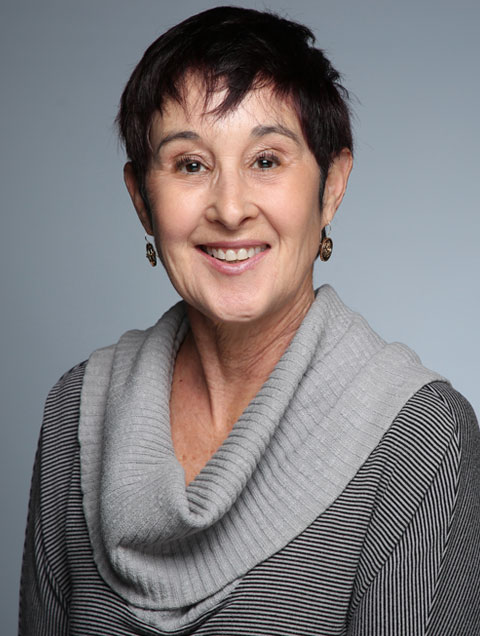Exploring Religion through Poetry:
Faculty Feature with Maeera Shreiber
By Alyssa Quinn

Maeera Shreiber
In her twenties, Maeera Shreiber, professor of English and chair of Jewish Studies Initiative, attended her grandmother’s funeral services. In accordance with Jewish custom, the assembled friends and family joined together to shovel dirt over the casket. A non-Jewish friend also took up a shovel – only to have it grabbed out of his hands by Shreiber’s father, who then pushed the man aside. Halacha, Jewish law, dictates that that Jews should be buried only by fellow Jews, and although Shreiber’s father was a secular Jew with “exquisite manners,” the importance of this Jewish/non-Jewish boundary was deeply engrained in him – to the point that it overpowered social niceties.
Shreiber recounts this graveside experience in her new book, “Holy Envy: Writing in the Jewish Christian Borderzone.” The book focuses on interreligious exchanges between Judaism and Christianity and explores the powerful emotions which this contact zone churns up: desire, envy, anxiety, fury, shame, and more. In writing about religious borderzones, Shreiber references feminist scholar Gloria Anzaldúa’s term “borderlands,” which describes “discomforting, volatile spaces” in which disparate worlds “‘grate’ and ‘bleed’ into each other.” When it comes to religion, such regions can become especially fraught, as they concern themselves with the difference between the sacred and the profane, the hallowed and the transgressive.
The title of Shreiber’s book, “Holy Envy,” comes from a phrase coined by Swedish theologian Krister Stendahl. In 1985, the Church of Jesus Christ of Latter-Day Saints built a new temple in Stockholm, sparking vocal opposition from locals. At a press conference on the subject, Stendahl urged greater religious tolerance. His advice: when encountering people of other faiths, leave room for “holy envy.” That is, be willing to recognize elements of other religions which you admire, or even wish you could somehow incorporate into your own.
Or at least, that’s one way to interpret the phrase. Shreiber, however, was interested in exploring some of the darker feelings that swirl around the idea of envy – what she calls “the demonic aspects of envy.” One of the best ways to explore those feelings? Poetry.
“Holy Envy” focuses primarily on modern and contemporary poets who are writing in the Jewish Christian borderzone. One important figure is the Jewish American poet Karl Shapiro. In 1948, Shapiro served as a judge for the prestigious Bollingen Prize for Poetry. When his fellow judges chose to award Ezra Pound the prize, despite Pound’s toxic antisemitism, and against Shapiro’s protests, he was forced to confront his own Jewish identity in a way he never had before. “It opened up an avalanche of dark, dark, twisted poetry,” says Shreiber. “But it’s poetry that makes a real effort to name feelings that often get submerged.”
The coursing of antisemitism is a backdrop for many of the poets in the book, and that’s one thing that surprised Shreiber about working on it – how sad it was. “It was a hard book to write in some ways,” she said.
“There’s a lot of grief to these poets, and a realization of how painful those encounters can be. That’s something I wasn’t prepared for: that it would bring a certain darkness to my own soul.”
But the process of surfacing experiences that are often ignored was also a deeply rewarding one. Modernist poetry, Shreiber’s area of expertise, is often described as being a highly secular domain, one which pits poetry and religion against each other, or which seeks to replace religion with poetry. But over the course of her career, Shreiber has destabilized that assumption. She has brought religion, specifically Jewishness, into the conversation. Her first book, “Singing in a Strange Land: A Jewish American Poetics,” has become a standard in the field of Jewish American poetry, filling what was hitherto a glaring void in literary studies. “I made my career out of an interest in how Jewishness opens up understanding of certain poetry in America, and how that poetry in turn opens up understanding about Jewish thought.”
Shreiber is continuing to explore the relationship between poetry and religion in her current work-in-progress, “Poetry as Prayer,” a critical edition and translation of contemporary Israeli poetry. The book employs translation not only in a literal sense, but in a metaphoric one as well. “I’m thinking about how translation, or moving something from one side of meaning to another side of meaning, works also as a way of thinking about poetry and prayer and the slippage between the two,” she says of the book. She adds that the process of translation can be a really valuable way to approach poems. “When you’re translating,” she says, “there’s a discovery of the strangeness of language. That helps a lot when you’re trying to read poetry with students.”
Shreiber observes that the status of religion within literary studies has changed a lot in recent decades. Early in her career, religion and questions of the sacred were looked at a little bit askance in English departments. But now the discipline is in a different place. Her students are only too eager to explore questions of religion and faith, and to grapple with it in their poetry just as they do in their everyday lives. This has made Shreiber more relaxed and confident in her explorations as well. For a long time, she felt that, as an academic, she had to leave her own spiritual questing at the door. But now?
“No,” she says, smiling wide. “I’m done with that.”
MEDIA CONTACTS
Jana Cunningham, University of Utah College of Humanities
jana.cunningham@utah.edu | 801-213-0866
Published January 11, 2024
